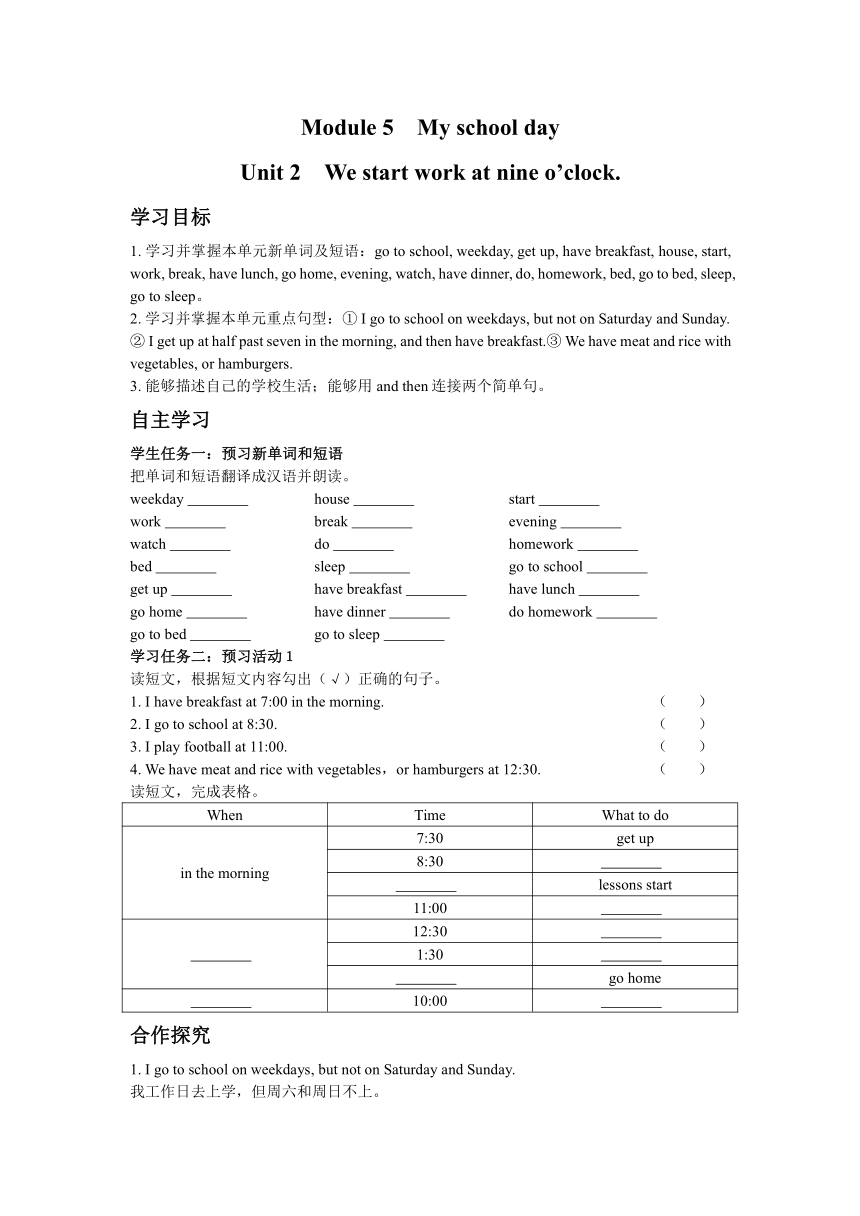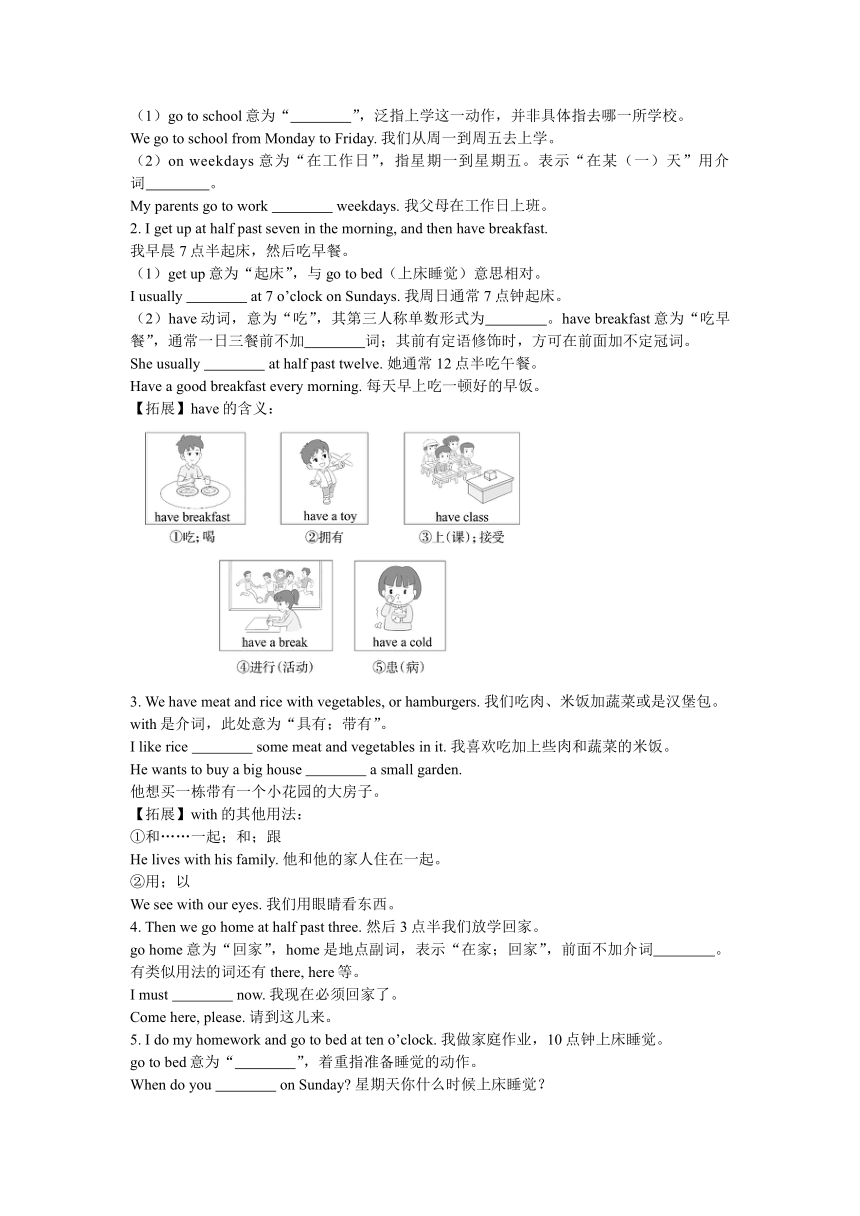外研版七年级上册 Module 5 My school day Unit 2学案(含答案)
文档属性
| 名称 | 外研版七年级上册 Module 5 My school day Unit 2学案(含答案) |

|
|
| 格式 | docx | ||
| 文件大小 | 75.2KB | ||
| 资源类型 | 教案 | ||
| 版本资源 | 外研版 | ||
| 科目 | 英语 | ||
| 更新时间 | 2022-12-04 00:00:00 | ||
图片预览


文档简介
Module 5 My school day
Unit 2 We start work at nine o’clock.
学习目标
1. 学习并掌握本单元新单词及短语:go to school, weekday, get up, have breakfast, house, start, work, break, have lunch, go home, evening, watch, have dinner, do, homework, bed, go to bed, sleep, go to sleep。
2. 学习并掌握本单元重点句型:① I go to school on weekdays, but not on Saturday and Sunday.
② I get up at half past seven in the morning, and then have breakfast.③ We have meat and rice with vegetables, or hamburgers.
3. 能够描述自己的学校生活;能够用and then连接两个简单句。
自主学习
学生任务一:预习新单词和短语
把单词和短语翻译成汉语并朗读。
weekday house start
work break evening
watch do homework
bed sleep go to school
get up have breakfast have lunch
go home have dinner do homework
go to bed go to sleep
学习任务二:预习活动1
读短文,根据短文内容勾出(√)正确的句子。
1. I have breakfast at 7:00 in the morning. ( )
2. I go to school at 8:30. ( )
3. I play football at 11:00. ( )
4. We have meat and rice with vegetables,or hamburgers at 12:30. ( )
读短文,完成表格。
When Time What to do
in the morning 7:30 get up
8:30
lessons start
11:00
12:30
1:30
go home
10:00
合作探究
1. I go to school on weekdays, but not on Saturday and Sunday.
我工作日去上学,但周六和周日不上。
(1)go to school意为“ ”,泛指上学这一动作,并非具体指去哪一所学校。
We go to school from Monday to Friday. 我们从周一到周五去上学。
(2)on weekdays意为“在工作日”,指星期一到星期五。表示“在某(一)天”用介词 。
My parents go to work weekdays. 我父母在工作日上班。
2. I get up at half past seven in the morning, and then have breakfast.
我早晨7点半起床,然后吃早餐。
(1)get up意为“起床”,与go to bed(上床睡觉)意思相对。
I usually at 7 o’clock on Sundays. 我周日通常7点钟起床。
(2)have动词,意为“吃”,其第三人称单数形式为 。have breakfast意为“吃早餐”,通常一日三餐前不加 词;其前有定语修饰时,方可在前面加不定冠词。
She usually at half past twelve. 她通常12点半吃午餐。
Have a good breakfast every morning. 每天早上吃一顿好的早饭。
【拓展】have的含义:
3. We have meat and rice with vegetables, or hamburgers. 我们吃肉、米饭加蔬菜或是汉堡包。
with是介词,此处意为“具有;带有”。
I like rice some meat and vegetables in it. 我喜欢吃加上些肉和蔬菜的米饭。
He wants to buy a big house a small garden.
他想买一栋带有一个小花园的大房子。
【拓展】with的其他用法:
①和……一起;和;跟
He lives with his family. 他和他的家人住在一起。
②用;以
We see with our eyes. 我们用眼睛看东西。
4. Then we go home at half past three. 然后3点半我们放学回家。
go home意为“回家”,home是地点副词,表示“在家;回家”,前面不加介词 。有类似用法的词还有there, here等。
I must now. 我现在必须回家了。
Come here, please. 请到这儿来。
5. I do my homework and go to bed at ten o’clock. 我做家庭作业,10点钟上床睡觉。
go to bed意为“ ”,着重指准备睡觉的动作。
When do you on Sunday 星期天你什么时候上床睡觉?
盘点收获
词汇 上学 工作日 起床 吃早餐 房子;住宅 开始 学习;工作 (课间)休息 吃午餐 回家 晚上 看,观看 吃饭;吃晚餐 做;干 家庭作业 床 上床睡觉 睡觉 开始睡觉;入睡
句型 1. 我早晨7点半起床,然后吃早餐。 2. 我们上午上三节课。 3. 他们去操场踢足球,但是我不喜欢足球。 4. 我喝果汁或水。
写作 描述自己的学校生活;用and then连接两个简单句
当堂达标
Ⅰ. 根据汉语提示写单词
1. Our school library is open on (工作日).
2. The Greens live in a big and beautiful (房子).
3. We (开始)lessons at half past one in the afternoon.
4. On Saturday we watch TV (或者)play games.
5. After having two lessons, we have a (休息).
Ⅱ. 用所给词的适当形式填空
1. What (be)your lessons on Monday morning
2. We (not go)home for lunch.
3. They (work)on Sunday.
4. (lesson)start at eight o’clock in the morning.
5. We do our (homework)in the evening.
Ⅲ. 句型转换
1. I go to school at 8:30.(对画线部分提问)
you to school
2. They have breakfast at home.(改为否定句)
They breakfast at home.
3. In the afternoon, we have a break. We play football.(用and then把两个句子连起来)
In the afternoon, we have a break, .
4. We start lessons at nine o’clock.(改为一般疑问句)
you lessons at nine o’clock
5. They do the housework in the evening.(改为否定句)
They the housework in the evening.
学后反思
_____________________________________________________________________________________________________________________________________________________________________________________________________________________________________________
当堂达标答案与解析:
Ⅰ. 1. weekdays 2. house 3. start 4. or 5. break
Ⅱ. 1. are 由空格后的your lessons可知此处be动词用are。
2. don’t go go为行为动词,主语为we,故否定形式应借助助动词do的否定形式don’t,谓语动词用原形。
3. work 该句主语为they,谓语动词应用原形,故填work。
4. Lessons 该句谓语动词用了原形,主语应用复数形式,注意首字母应大写。
5. homework do one’s homework意为“做作业”,为固定搭配。
Ⅲ. 1. When do, go 2. don’t have 3. and then play football 4. Do, start 5. don’t do
Unit 2 We start work at nine o’clock.
学习目标
1. 学习并掌握本单元新单词及短语:go to school, weekday, get up, have breakfast, house, start, work, break, have lunch, go home, evening, watch, have dinner, do, homework, bed, go to bed, sleep, go to sleep。
2. 学习并掌握本单元重点句型:① I go to school on weekdays, but not on Saturday and Sunday.
② I get up at half past seven in the morning, and then have breakfast.③ We have meat and rice with vegetables, or hamburgers.
3. 能够描述自己的学校生活;能够用and then连接两个简单句。
自主学习
学生任务一:预习新单词和短语
把单词和短语翻译成汉语并朗读。
weekday house start
work break evening
watch do homework
bed sleep go to school
get up have breakfast have lunch
go home have dinner do homework
go to bed go to sleep
学习任务二:预习活动1
读短文,根据短文内容勾出(√)正确的句子。
1. I have breakfast at 7:00 in the morning. ( )
2. I go to school at 8:30. ( )
3. I play football at 11:00. ( )
4. We have meat and rice with vegetables,or hamburgers at 12:30. ( )
读短文,完成表格。
When Time What to do
in the morning 7:30 get up
8:30
lessons start
11:00
12:30
1:30
go home
10:00
合作探究
1. I go to school on weekdays, but not on Saturday and Sunday.
我工作日去上学,但周六和周日不上。
(1)go to school意为“ ”,泛指上学这一动作,并非具体指去哪一所学校。
We go to school from Monday to Friday. 我们从周一到周五去上学。
(2)on weekdays意为“在工作日”,指星期一到星期五。表示“在某(一)天”用介词 。
My parents go to work weekdays. 我父母在工作日上班。
2. I get up at half past seven in the morning, and then have breakfast.
我早晨7点半起床,然后吃早餐。
(1)get up意为“起床”,与go to bed(上床睡觉)意思相对。
I usually at 7 o’clock on Sundays. 我周日通常7点钟起床。
(2)have动词,意为“吃”,其第三人称单数形式为 。have breakfast意为“吃早餐”,通常一日三餐前不加 词;其前有定语修饰时,方可在前面加不定冠词。
She usually at half past twelve. 她通常12点半吃午餐。
Have a good breakfast every morning. 每天早上吃一顿好的早饭。
【拓展】have的含义:
3. We have meat and rice with vegetables, or hamburgers. 我们吃肉、米饭加蔬菜或是汉堡包。
with是介词,此处意为“具有;带有”。
I like rice some meat and vegetables in it. 我喜欢吃加上些肉和蔬菜的米饭。
He wants to buy a big house a small garden.
他想买一栋带有一个小花园的大房子。
【拓展】with的其他用法:
①和……一起;和;跟
He lives with his family. 他和他的家人住在一起。
②用;以
We see with our eyes. 我们用眼睛看东西。
4. Then we go home at half past three. 然后3点半我们放学回家。
go home意为“回家”,home是地点副词,表示“在家;回家”,前面不加介词 。有类似用法的词还有there, here等。
I must now. 我现在必须回家了。
Come here, please. 请到这儿来。
5. I do my homework and go to bed at ten o’clock. 我做家庭作业,10点钟上床睡觉。
go to bed意为“ ”,着重指准备睡觉的动作。
When do you on Sunday 星期天你什么时候上床睡觉?
盘点收获
词汇 上学 工作日 起床 吃早餐 房子;住宅 开始 学习;工作 (课间)休息 吃午餐 回家 晚上 看,观看 吃饭;吃晚餐 做;干 家庭作业 床 上床睡觉 睡觉 开始睡觉;入睡
句型 1. 我早晨7点半起床,然后吃早餐。 2. 我们上午上三节课。 3. 他们去操场踢足球,但是我不喜欢足球。 4. 我喝果汁或水。
写作 描述自己的学校生活;用and then连接两个简单句
当堂达标
Ⅰ. 根据汉语提示写单词
1. Our school library is open on (工作日).
2. The Greens live in a big and beautiful (房子).
3. We (开始)lessons at half past one in the afternoon.
4. On Saturday we watch TV (或者)play games.
5. After having two lessons, we have a (休息).
Ⅱ. 用所给词的适当形式填空
1. What (be)your lessons on Monday morning
2. We (not go)home for lunch.
3. They (work)on Sunday.
4. (lesson)start at eight o’clock in the morning.
5. We do our (homework)in the evening.
Ⅲ. 句型转换
1. I go to school at 8:30.(对画线部分提问)
you to school
2. They have breakfast at home.(改为否定句)
They breakfast at home.
3. In the afternoon, we have a break. We play football.(用and then把两个句子连起来)
In the afternoon, we have a break, .
4. We start lessons at nine o’clock.(改为一般疑问句)
you lessons at nine o’clock
5. They do the housework in the evening.(改为否定句)
They the housework in the evening.
学后反思
_____________________________________________________________________________________________________________________________________________________________________________________________________________________________________________
当堂达标答案与解析:
Ⅰ. 1. weekdays 2. house 3. start 4. or 5. break
Ⅱ. 1. are 由空格后的your lessons可知此处be动词用are。
2. don’t go go为行为动词,主语为we,故否定形式应借助助动词do的否定形式don’t,谓语动词用原形。
3. work 该句主语为they,谓语动词应用原形,故填work。
4. Lessons 该句谓语动词用了原形,主语应用复数形式,注意首字母应大写。
5. homework do one’s homework意为“做作业”,为固定搭配。
Ⅲ. 1. When do, go 2. don’t have 3. and then play football 4. Do, start 5. don’t do
同课章节目录
- Starte
- Module 1 My teacher and my friends
- Module 2 My English lesson
- Module 3 My English book
- Module 4 My everyday life
- Module 1 My classmates
- Unit 1 Nice to meet you.
- Unit 2 I'm Wang Lingling and I'm thirteen years ol
- Unit 3 Language in use.
- Module 2 My family
- Unit 1 Is this your mum?
- Unit 2 These are my parents.
- Unit 3 Language in use.
- Module 3 My school
- Unit 1 There are thirty students in my class.
- Unit 2 The library is on the left of the playgroun
- Unit 3 Language in use.
- Module 4 Healthy food
- Unit 1 We've got lots of apples.
- Unit 2 Is your food and drink healthy?
- Unit 3 Language in use.
- Module 5 My school day
- Unit 1 I love history.
- Unit 2 We start work at nine o'clock.
- Unit 3 Language in use.
- Revision module A
- Module 6 A trip to the zoo
- Unit 1 Does it eat meat?
- Unit 2 The tiger lives in Asia.
- Unit 3 Language in use.
- Module 7 Computers
- Unit 1 How do I write my homework on the computer?
- Unit 2 When do you use a computer?
- Unit 3 Language in use.
- Module 8 Choosing presents
- Unit 1 I always like birthday parties.
- Unit 2 She often goes to concerts.
- Unit 3 Language in use.
- Module 9 People and places
- Unit 1 We're enjoying the school trip a lot.
- Unit 2 They're waiting for buses or trains.
- Unit 3 Language in use.
- Module 10 Spring Festival
- Unit 1 Are you getting ready for Spring Festival?
- Unit 2 My mother's cleaning our houses and sweepin
- Unit 3 Language in use.
- Revision module B
